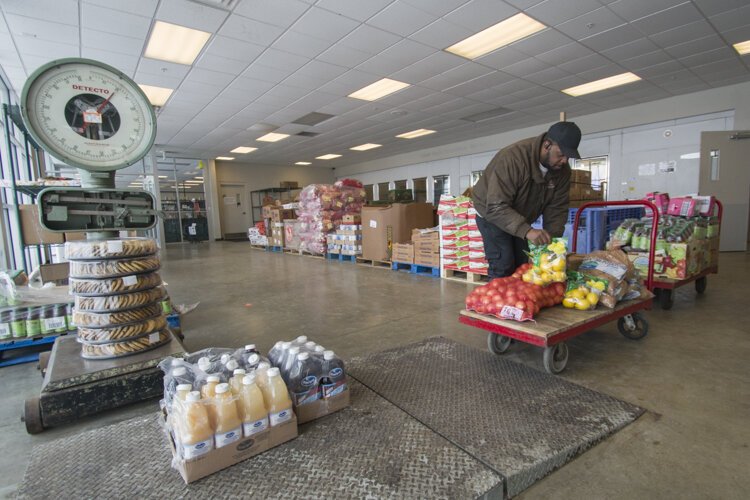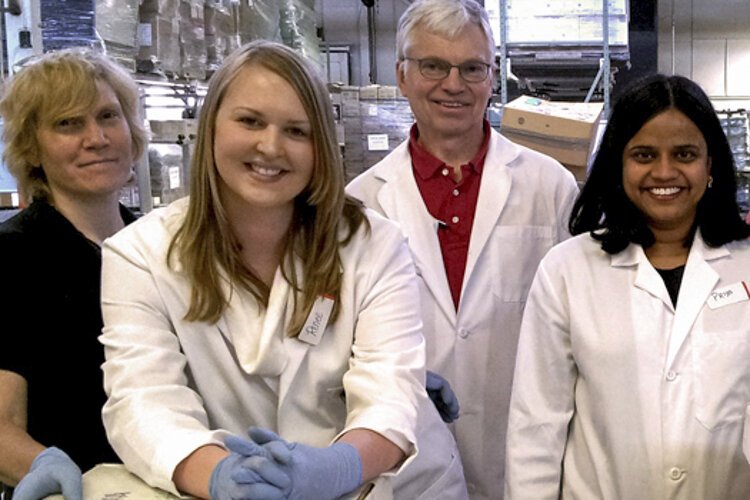How donations are reaching Cleveland's most vulnerable during the coronavirus crisis
Donations are marching in to battle the rapidly growing coronavirus pandemic in Cleveland.
With the Greater Cleveland COVID-19 Rapid Response Fund totaling $5.73 million, the Cleveland Foundation said March 27 that four nonprofit organizations will be the first to receive money to carry out their individual endeavors to support some of the most vulnerable people in Northeast Ohio during the coronavirus pandemic.
The Greater Cleveland Food Bank, MedWish International, the Northeast Ohio Coalition for the Homeless, and Senior Transportation Connection received grants ranging from $60,000 to $300,000 to provide help and resources to those who need it most.
The fund will continue to raise money and make weekly grant announcements throughout the duration of this pandemic. Donations of all sizes are accepted.
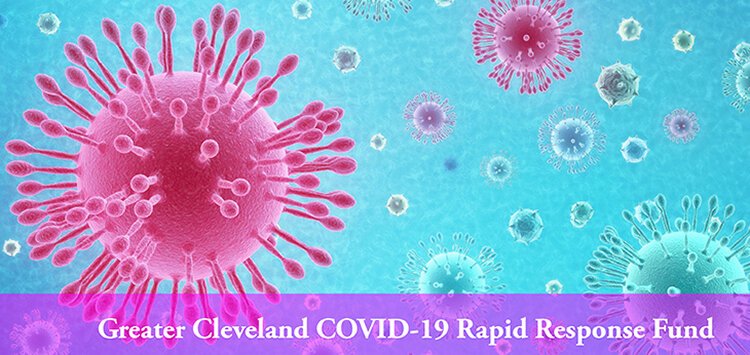
The group of organizations that initially created the fund began talking March 13 about a way to bring the community together and raise money to help and protect people facing the crisis, says Adrienne Mundorf, senior program director for the Sisters of Charity Foundation, one of the group's members.
By March 18, the Greater Cleveland COVID-19 Rapid Response Fund was established with $3.95 million in contributions from 18 persons, organizations and foundations—when the 31 confirmed COVID-19 cases in Cuyahoga County made up almost half of the cases in Ohio. The county still leads the state with 259 cases out of 1,139 as of Thursday.
“It really speaks to our community and our ability to come together to raise funds that support the regional nonprofits during this crisis,” Mundorf says. “We wanted to identify organizations that are on the front lines and providing services to the most vulnerable members of our community. We’re focusing on the most basic human needs as they emerge, as epidemiology of the disease changes.”
The four organizations fulfill the most basic needs in the Cleveland community: food, shelter, transportation, and medical goods and services. Here’s a look at what these four groups plan to do with the COVID-19 Rapid Response Fund grant money.
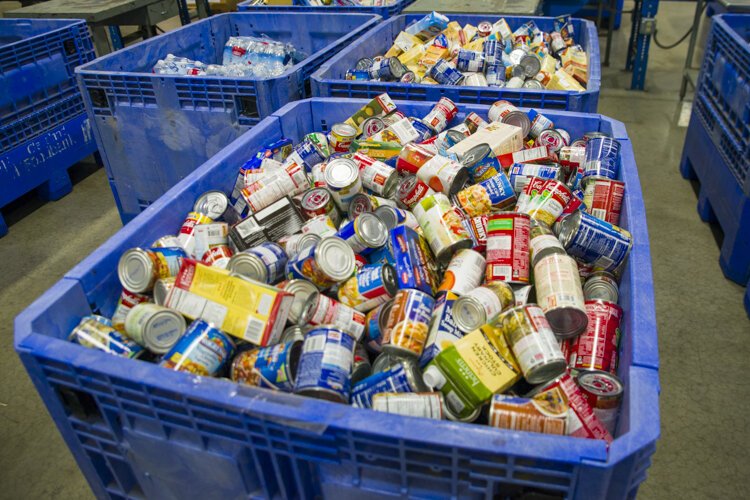 Food: Greater Cleveland Food Bank
Food: Greater Cleveland Food Bank
The Greater Cleveland Food Bank is the largest hunger relief organization in Northeast Ohio, serving more than 350,000 people in Cuyahoga, Ashtabula, Geauga, Lake, Ashland and Richland counties in 2019.
Since the outbreak hit Ohio, the need for food has increased. So, the food bank will use its $300,000 grant to supply the food insecure—including children, families, seniors, and individuals with health challenges.
“We are honored and humbled to be among the first recipients to receive support from the Greater Cleveland COVID-19 Rapid Response Fund,” says Kristin Warzocha, president and CEO of the food bank. “In just a matter of days, we have served an unprecedented number of families and seniors, who are new to our network, through our expanded on-site distributions, Help Center, backpack programs, senior meals, and [other services].”
The money will help subsidize emergency food resources as well as programming and supplies that will be needed in the coming weeks. The grant will help the food bank keep up with the demand, Warzocha says.
“Understanding that the tremendous influx of individuals in need of our services will continue to grow in the coming weeks and months, this funding will allow us to support our community with critical food resources during this time of great uncertainty,” she says.
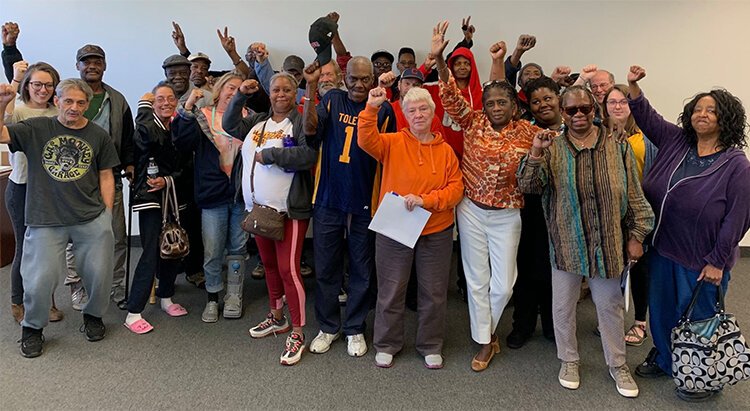 Since 1988, the Northeast Ohio Coalition for the Homeless has sought to break the cycle of homelessness.Shelter: Northeast Ohio Coalition for the Homeless
Since 1988, the Northeast Ohio Coalition for the Homeless has sought to break the cycle of homelessness.Shelter: Northeast Ohio Coalition for the Homeless
The homeless coalition has shifted its focus to serve the unsheltered homeless population after area drop-in centers, libraries, and churches—usually a daytime shelter option for the homeless population—have closed during the pandemic, says Molly Martin, the coalition's director of strategic initiatives.
The coalition will use its $70,000 grant to provide emergency lodging for unsheltered individuals to remain quarantined before the pandemic reaches its peak—avoiding risks associated with sleeping outside and allowing people to practice more effective social distancing.
“Our goal with the funding is to take the 50 most vulnerable, those over 55 or with underlying illnesses like COPD and asthma, into partner quarantined hotel rooms for eight weeks,” Martin says. “So, they will have the ability to shelter over the next two months.”
They usually see a surge in unsheltered homeless people in the spring, estimating as many as 200 people are unsheltered currently, with 1,200 in area shelters, Martin says.
Additionally, the coalition will be able to centralize outreach and coordinate efforts more effectively, since it will be easier to get food and supplies to the people it serves.
“We are honored and humbled to be among the first recipients to receive support from the Greater Cleveland COVID-19 Rapid Response Fund," she says. "In just a matter of days, we have served an unprecedented number of families and seniors, who are new to our network, through our expanded on-site distributions, Help Center, backpack programs, senior meals, and more. Understanding that the tremendous influx of individuals in need of our services will continue to grow in the coming weeks and months, this funding will allow us to support our community with critical food resources during this time of great uncertainty.”
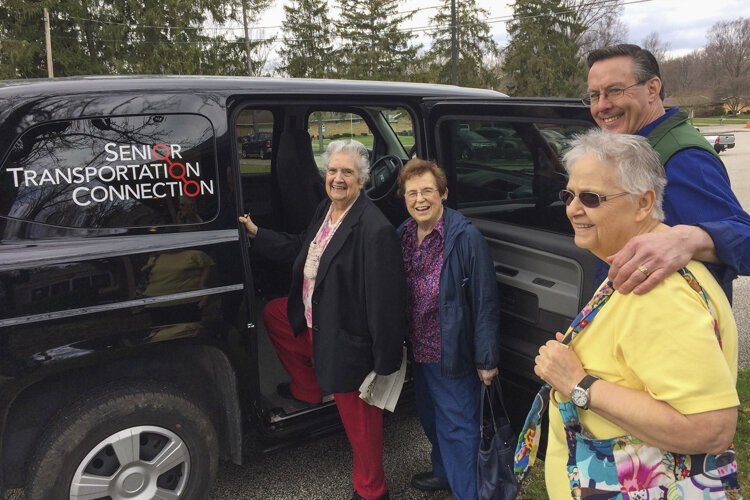 Senior Transportation ConnectionTransportation: Senior Transportation Connection
Senior Transportation ConnectionTransportation: Senior Transportation Connection
“I’m crying tears of happiness,” says Janice Dzigiel, executive director of Senior Transportation Connection, when she heard the news that they received $60,000 to help continue transportation for medical needs and food access to older adults. More than half of those served by the not-for-profit agency are 75 years and older, and nearly 60% are low income—two demographic groups identified as particularly vulnerable populations during this crisis.
With senior centers and community centers closed, Dzigiel says, 20% of their revenue has been cut in city payments for driving seniors to these places for adult care. The agency often serves as a last-resort service for older adults with mobility needs and limited social supports, she says.
At the same time, she says it’s critical to get their people to services such as dialysis appointments, which can be as often as three times a week, and to get groceries. The grant money will allow the agency to continue its essential services. “This is really a life saver,” she says.
 Medical equipment and supplies
Medical equipment and supplies
For more than 25 years, MedWish International has provided medical equipment and supplies to underserved communities around the world. Now, they are stepping up to help those in need within MedWish’s own community.
"Since we were founded in 1993, the local health-care community has supported and enabled MedWish to fulfill our humanitarian efforts globally thanks to their supply donations,” says Carolina Masri, MedWish executive director. “Our community is now in need, and through our local and domestic giving program, MedWish is ready to return the support we have received by providing all available supplies and equipment to our health-care workers and those on the front line fighting this pandemic. Our entire team is extremely proud.”
So far, MedWish has coordinated shipments of lifesaving supplies for the Cleveland Clinic, University Hospitals, MetroHealth, the Cuyahoga County Board of Health and other health-care facilities.
The company has donated to these institutions 47,703 masks, 71,850 gloves, 9,627 eye shields, bouffant caps, shoe covers, and other personal protective equipment, 9,285 adult respiratory supplies, 7,580 pediatric respiratory supplies, 8,960 gowns, and two ventilators.
MedWish will use its $70,000 grant to continue collecting personal protective equipment and other medical supplies—including ventilators and respiratory supplies—for Cleveland-area health-care institutions as quickly as possible.
The grant will also help MedWish coordinate local donation dropoff locations throughout the community to collect excess items individuals may have in their homes that are in high demand by local health-care facilities (such as gloves, masks, and hand sanitizer).
Right now, the only confirmed dropoff location is at MedWish’s headquarters, 1625 East 31st Street.


